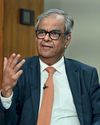Connectivity, security, costs and bitcoin usage are among the key issues to be resolved as India moves towards a digitised economy.

Mobile-based digital payments have been growing phenomenally worldwide. Around 23 per cent of global consumers have adopted it, according to surveys, while among early users of smartphones, the figure is 35 per cent. The Scandinavian nations – Norway, Sweden and Denmark – as well as the UK, France and Belgium are well on their way to becoming entirely cashless. Close on their heels are Canada, Australia and South Korea. India is way, way behind, but with the acute cash shortage following the demonetisation decision, it is expected to also take a quantum leap in the same direction soon. What are the main concerns as usage of e-wallets and plastic money multiplies and bitcoins grow in popularity?
CONNECTIVITY AND SECURITY
The first major challenge to taking the cashless economy to every corner of the country is poor Internet connectivity and limited smartphone penetration. "The basis of digital currency is connectivity," says Tejasvi Mohanram, founder and CEO of personal finance platform, Rupee Power. “Unless net connectivity improves radically in rural areas, online transactions can never become a way of life.” Not surprisingly, e-wallet companies like Paytm and MobiKwik are trying to overcome the problem in different ways, but as long as connectivity remains sporadic or limited, a cashless economy will be a distant dream. “We have launched a lighter version of MobiKwik called MobiKwik lite, which can even be used by old smartphones with low data connectivity,” says Bipin Preet Singh, Founder-CEO and Director, MobiKwik. “A mechanism by which even feature phones will be able to make payments using SMSs is also being worked on.”
Diese Geschichte stammt aus der January 15, 2017-Ausgabe von Business Today.
Starten Sie Ihre 7-tägige kostenlose Testversion von Magzter GOLD, um auf Tausende kuratierte Premium-Storys sowie über 8.000 Zeitschriften und Zeitungen zuzugreifen.
Bereits Abonnent ? Anmelden
Diese Geschichte stammt aus der January 15, 2017-Ausgabe von Business Today.
Starten Sie Ihre 7-tägige kostenlose Testversion von Magzter GOLD, um auf Tausende kuratierte Premium-Storys sowie über 8.000 Zeitschriften und Zeitungen zuzugreifen.
Bereits Abonnent? Anmelden

"Inaction is worse than mistakes"
What was the problem you were grappling with?

TEEING OFF WITH TITANS
BUSINESS TODAY GOLF RESUMES ITS STORIED JOURNEY WITH THE 2024-25 SEASON OPENER IN DELHI-NCR. THERE ARE SIX MORE CITIES TO COME

AI FOOT FORWARD
THE WHO'S WHO OF THE AI WORLD GATHERED AT THE TAJ MAHAL PALACE IN MUMBAI TO DELIBERATE THE TRANSFORMATIVE IMPACT OF AI ON INNOVATION, INDUSTRIES, AND EVERYDAY LIFE.

Decolonising the Walls
ART START-UP MAAZI MERCHANT IS ON A MISSION TO BRING INDIA'S FORGOTTEN ART BACK HOME

"I'm bringing Kotak under one narrative, one strategy, one umbrella”
Ashok Vaswani is a global banker who spent most of his career overseas at institutions like Citi Group and Barclays, among others.

CHOOSING THE CHAMPIONS
The insights and methodology behind the BT-KPMG India's Best Banks and NBFCs Survey 2023-24.

'INDIA IS AT AN EXTREMELY SWEET SPOT'
The jury members of the BT-KPMG Survey of India's Best Banks and NBFCs discuss developments in the banking sector and more

FROM CRISIS TO TRIUMPH
Dinesh Kumar Khara stewarded SBI through multiple challenges during his tenure, while ensuring that profits tripled, productivity soared, and the bank consolidated its global standing

AT A CROSSROADS
BANKS ARE FACING CHALLENGES ON BOTH SIDES OF THE BALANCE SHEET-ASSETS AS WELL AS LIABILITIES-WHICH ARE PUTTING PRESSURE ON MARGINS.

EXPANSIVE VISION
Bajaj Finance, an outlier in terms of digitisation, faces stiff competition. But it continues to expand its reach